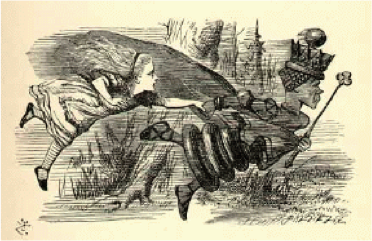7.4 The Red Queen
What does Lewis Carroll’s Red Queen have to do with sex?[1]
-

Figure 7.6 “Through the Looking Glass” by John Tenniel
In this scene from Through the Looking-Glass and What Alice Found There by Lewis Carroll, Alice and the Queen run with all their effort – yet make no progress. Such is the claim that sex allows organisms to avoid extinction by keeping up in a very odd sort of race.
Alice never could quite make it out, in thinking it over afterwards, how it was that they began: all she remembers is that they were running hand in hand, and the Queen went so fast that it was all she could do to keep up with her: and still the Queen kept crying “Faster! Faster!”, but Alice felt she could not go faster, though she had not breath left to say so.
The most curious part of the thing was, that the trees and the other things round them never changed their places at all: however fast they went, they never changed their places at all: however fast they went they never seemed to pass anything. “I wonder if all the things move along with us?” thought poor puzzled Alice. And the Queen seemed to guess her thoughts, for she cried “Faster! Don’t try to talk!”
Not that Alice had any idea of doing that. She felt as if she would never be able to talk again, she was getting so much out of breath: and still the Queen cried “Faster! Faster!”, and dragged her along. “Are we nearly there?” Alice managed to pant out at last.
“Nearly there!” the Queen repeated. “Why, we passed it ten minutes ago! Faster!” And they ran on for a time in silence, with the wind whistling in Alice’s ears, and almost blowing her hair off her head, she fancied
“Now! Now!” cried the Queen. “Faster! Faster!” And they went so fast that at last they seemed to skim through the air, hardly touching the ground with their feet, till suddenly, just as Alice was getting quite exhausted, they stopped, and she found herself sitting on the ground, breathless and giddy.
The Queen propped her up against a tree, and said kindly, “You may rest a little, now.”
Alice looked round her in great surprise. “Why, I do believe we’ve been under this tree the whole time! Everything’s just as it was!”
“Of course it is, “ said the Queen. “What would you have it?”
“Well, in our country, “ said Alice, still panting a little, “you’d generally get to somewhere else – if you ran very fast for a long time as we’ve been doing.”
“A slow sort of country!” said the Queen. “Now here, you see, it takes all the running you can do, to keep in the same place. If you want to get somewhere else, you must run at least twice as fast as that!”
“I’d rather not try, please!” said Alice….
Through the Looking-Glass and What Alice Found There by Lewis Carroll
Is sex part of an arms race?
In one human generation, HIV (the virus that causes AIDS) will reproduce over a million times. Given how natural selection works—via heritable variation and differential reproduction—human beings don’t stand a chance against this virus. How can we possibly adapt to such a fast-moving target? For that matter, how can any longer-lived organism compete with a quickly reproducing and quickly evolving enemy? Many of these enemies, or pathogens, such as viruses and bacteria, are also numerous and difficult to detect—invisible to the naked eye, they can enter a host’s body silently and reproduce with a fervor while their victims remain blissfully unaware. Given these challenges, how can any host organism defend itself against its would-be attackers? According to one hypothesis, outwitting pathogens is the whole point of sex.
The Red Queen
We are in the midst of an evolutionary arms race, in which host and parasitic pathogen must constantly adapt. Parasites must adapt to the host’s natural defenses, and host populations are under pressure to keep up with their ever-changing parasites. This reciprocal evolution between two types of organisms (in this case, host and parasite) is a type of coevolution. According to the Red Queen Hypothesis, sex exists as a mechanism for keeping up with rapidly coevolving pathogens. By generating genetic diversity, sex makes host organisms a moving target. Like Alice and the Red Queen in Lewis Carroll’s novel (Box 3), both host and parasite are running a race in which neither makes any observable progress. Yet, if the host organisms didn’t change dramatically with each new generation (if they didn’t have sex), they might go extinct.
Parasites adapt to exploit the most common type of host. Therefore, a host that can produce offspring that have novel defenses against parasites would have an advantage over an organism producing clones–simply by making offspring that are different.
- Public Domain, https://commons.wikimedia.org/w/index.php?curid=2040219 ↵

